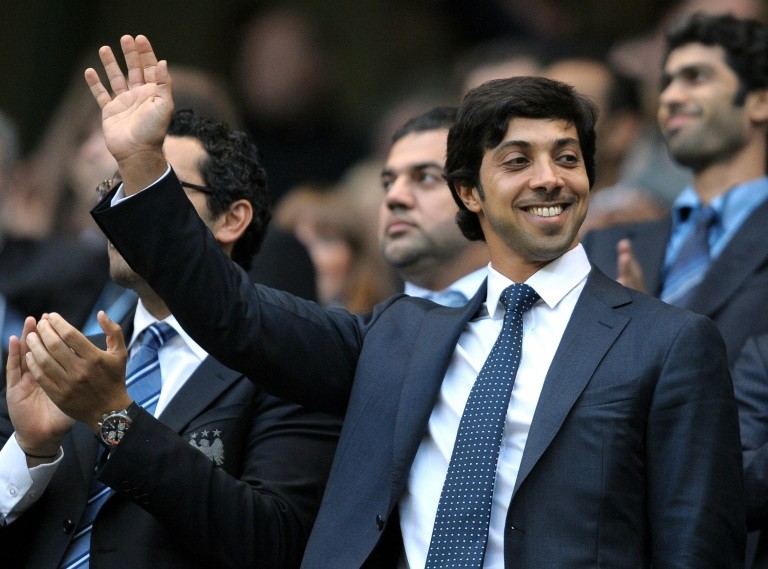Manchester City have enjoyed a meteoric rise from mid-table mediocrity to serial trophy winners thanks to the deep pockets of Abu Dhabi’s Sheikh Mansour. But now they face their biggest challenge of the new era.
European football’s governing body UEFA on Friday banned City from European competitions for the next two seasons and imposed a fine of 30 million euros ($32 million, £25 million) on the English champions.
City are up for the fight and will have their day in court. The club immediately responded that they would appeal to the Court of Arbitration for Sport for what they called “an impartial judgement”.
However, failure to overturn the ban, even if it is reduced to just a one-season suspension, would have huge ramifications for City on and off the field.
 AFP / Glyn KIRKPremier League champions Manchester City face a two-year ban from the Champions League
AFP / Glyn KIRKPremier League champions Manchester City face a two-year ban from the Champions LeagueSince the Sheikh Mansour takeover in 2008, City have won 10 major trophies — four Premier League titles, two FA Cups and four League Cups.
Yet the prize that has eluded them is the one the Abu Dhabi project most desires — the UEFA Champions League.
What did City do wrong?
City have been found to be in breach of UEFA’s financial fair play rules, which place restrictions on how much money a club can lose.
Over a three-year period, clubs are not permitted to lose more than 30 million euros with exceptions for some costs such as youth development and women’s teams.
UEFA’s Club Financial Control Body found that City ensured they did not fall foul of those restrictions by overstating their sponsorship revenue between 2012 and 2016.
The case against City was reopened when German magazine Der Spiegel published a series of leaked emails in 2018 that seemed to show how City had manufactured extra sponsorship revenue from a series of companies with connections to the Abu Dhabi United Group, owned by Sheikh Mansour.
City strenuously deny that accusation.
The consequences of a ban
 AFP/File / Lindsey PARNABYManchester City’s Champions League ban could affect the futures of star players such as Kevin De Bruyne (right) and Raheem Sterling (left)
AFP/File / Lindsey PARNABYManchester City’s Champions League ban could affect the futures of star players such as Kevin De Bruyne (right) and Raheem Sterling (left)Should City’s appeal fail, there could be repercussions for the futures of manager Pep Guardiola and a host of star players.
Guardiola’s contract runs until the end of the 2020/21 season, but the only major task left for the Catalan in Manchester is to make City European champions for the first time.
Under the former Barcelona and Bayern Munich boss, the club rewrote the record books in storming to the Premier League title with 100 points in 2017/18 and won a first-ever domestic treble of trophies in English football last season.
City have fallen off the pace in the title race this season, 22 points behind leaders Liverpool in second place.
Guardiola suggested this week he could even be sacked if his side fail to beat Real Madrid in the Champions League last-16 but while that is highly unlikely, he may not want to hang around for another season if there are only domestic prizes up for grabs.
Similarly, players such as Kevin De Bruyne and Raheem Sterling are unlikely to want to waste two of their peak years without Champions League football.
It would still take huge fees from rival clubs to tempt City to sell, but they may be forced to downsize to gain re-entry to the Champions League even after their ban is over.
City made 93 million euros from UEFA prize money and TV rights from last season’s Champions League, with gate receipts and extra sponsorship revenue from Europe’s premier club competition added to that tally.
It would be almost impossible for the club to lose that level of revenue for two years and remain FFP-compliant without cutting costs on transfer fees and wages, or selling players.
The sanctions may not even have stopped with UEFA. A Premier League investigation into City’s compliance with FFP is also ongoing and could result in a points deduction.
Will Abu Dhabi investment dry up?
The great unknown is how Abu Dhabi reacts to the setback. Former City CEO Garry Cook told The Athletic in December the aim of their takeover was to “create a proxy brand for Abu Dhabi.”
Is that brand now damaged goods, particularly if FFP restrictions mean City’s success on the field is curtailed?
On the other hand, the huge investment from Abu Dhabi has already lifted City to the status of one of the world’s heavyweight clubs.
The club have reported a combined profit for the past five years of £51 million and revenues have risen to £535 million a year.
City are strong enough financially to compete and be FFP-compliant. It is how they got to that stage that has been their downfall.
AFP

